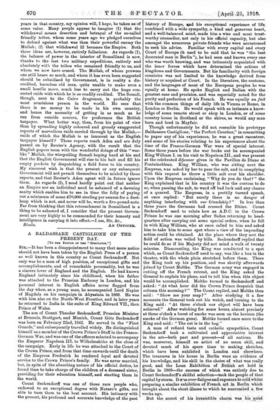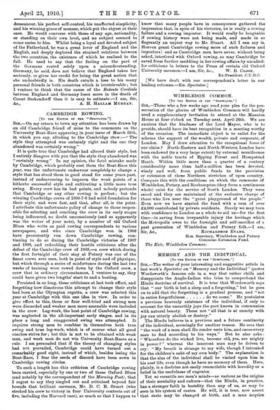A BALDASSARE CASTIGLIONE OF THE PRESENT DAY.
ITo THE EDITOR Or THE "SPECTATOR."] SIR,-It has been a disappointment to many that more notice should not have been taken by the English Press of a person so well known in this country as Count Seckendorff. Not only was he a man of high position, of exceptional gifts and accomplishments, and of remarkable personality, but he was a sincere lover of England and the English. He had known England intimately since his childhood, when his father was attached to the Prussian Embassy in London, and his personal interest in English affairs never flagged from the day when, as a young man, he accompanied Lord Napier of Magdala on his campaign in Abyssinia in 1868. He was with him also on the North-West Frontier, and in later years he returned to India in the suite of King Edward VII., then Prince of Wales.
The son of Count Theodor Seckendorff, Prussian Minister at Brussels, Stuttgart, and Munich, Count Giitz Seckendorff was born on February 22nd, 1842. He served in the "First Guards," and subsequently travelled widely. He distinguished himself as a member of the Crown Prince's Staff in the Franco- German War, and was one of the officers selected to accompany the Emperor Napoleon III. to Wilhelmshohe at the close of the campaign. Early in life he was attached to the Court of the Crown Prince, and from that time onwards until the death of the Empress Frederick he rendered loyal and devoted service to the Crown Prince's family. He was never married, but, in spite of the absorbing nature of his official duties, be found time to take charge of the children of a deceased sister, providing for their education himself, and starting them in the world.
Count Seckendorff was one of those rare people who, endowed to an exceptional degree with Nature's gifts, are able to turn them to the best account. His intimacy with the present, his profound and accurate knowledge of the past
history of Europe, staid his exceptional experience of
combined with a wide sympathy, a kind and generous heart, and a well-balanced mind, made him a wise and most trust- worthy counsellor, not only in his official capacity, but also amongst the numerous private friends who were accustomed to seek his advice. Familiar with every capital and every Court of Europe (it used to be said that he was " the best decorated man in Berlin"), he had seen and known every one who was worth knowing, and was intimately acquainted with the inner forces which have determined the actions of kingdoms and Governments. But his familiarity with foreign countries was not limited to the knowledge derived from history or acquired at Court. In the literature, the customs, and the languages of most of the European peoples he was equally at home. He spoke English and Italian with the greatest ease and precision, and was especially noted for the
purity and perfection of his French. He was equally au fail with the common things of daily life in Vienna or Rome, in
London or Berlin. He would speak with as intimate a know- ledge of some remote street or shop in London, or of some country house in Scotland or the shires, as would any man born and bred in Mayfair.
Though unfortunately he did not resemble his prototype Baldassare Castiglione, "the Perfect Courtier," in committing to paper any of his experiences, he was a great raconteur, and some of his stories relating to his experiences about the time of the Franco-German War were of special interest.
Some three years before the war broke out he accompanied
King William I. on his visit to Napoleon III., and was present at the celebrated cl6euner given in the Pavillon de Diane at
Fontainebleau. King William, who was sitting next the Empress, v,as asked by her to pass the salt, and in complying with this request he threw a little salt over his shoulder.
Upon the Empress exclaiming, " Why do you do that " the King explained that in his country it was the custom to do so, when passing the salt, to ward off bad luck and any chance of a quarrel. The Empress, in a prettily turned speech,
at once replied: " But surely there is no danger of anything interfering with our friendship ?" In less than
three years the Germans had crossed the Rhine. Count Seckendorff used to relate bow as A.D.C. to the Crown Prince he was one morning after Sedan returning to head- quarters after carrying out some special orders, when he fell in with King William, who at once called to him and asked him to take him to some spot where a view of the impending action could be obtained. At the place where they met the field of action was veiled by hills. Seckendorff replied that he could do so if his Majesty did not mind a walk of twenty minutes. Dismounting, the King was conducted to a spot which, as Count Seckendorff used to say, was like a box in the theatre, with the whole plain stretched before them. There the King took up his position, and was shortly afterwards joined by Count Moltke. The German army was engaged in cutting off the French retreat, and the King asked the General to explain his plans, and to tell him when this object would be accomplished. Moltke turned to Seckendorff and asked: "At what hour did the Crown Prince despatch that column this morning ?" The Count replied, and Moltke then said : " Show me your map ? " After studying it a few moments the General took out his watch, and turning to the King said : " At three o'clock our object will have been achieved." After watching for some hours, almost precisely at three o'clock a burst of smoke was seen on the horizon (the smoke of the German guns). Moltke turned once more to the King and said : " The cat is in the bag."
A man of refined taste and catholic sympathies, Count Seckendorff took a cultivated and appreciative interest in the art—both past and present--of all nations. He was, moreover, himself an artist of no mean skill, and devoted much of his spare time to making sketches, which have been exhibited in London and elsewhere.
The treasures in his house in Berlin were an evidence of his knowledge, and his skill in the choice of what was really
good, and the Loan Exhibition, of British art held in Berlin in 1908—the success of which was entirely due to Count Seckendorff 's skilful selection—took the people of that capital by storm. Itw%s over-fatigue and exposure to cold whilst preparing a similar exhibition of French art in Berlin which brought about the short illness to which he succumbed a few weeks ago.
But the secret of his irresistible charm was his quiet
demeanour, his perfect self-control, his unaffected simplicity, and his winning grace of manner, which put the shyest at their ease. He would converse with those of any age, nationality, or standing on their own level, and no subject seemed to ME10 amiss to him. Whilst being a loyal and devoted subject of the Fatherland, he was a great lover of England and the English, and deeply deplored the strained relations between the two countries, the existence of which he realised to the full: He used to say that the feeling on the part of the Germans rested solely upon a misunderstanding. Germany, he said, does not believe that England takes her seriously, or gives her credit for being the great nation that she undoubtedly is. His death entails a loss to his many personal friends in both countries which is irretrievable ; but I venture to think that the cause of the Entente' Cordiale between England and Germany loses more in the death of Count Seckendorff than it is easy to estimate.—I am, Sir,















































 Previous page
Previous page